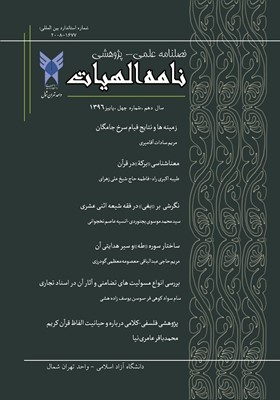تبیین اخلاق مهندسی از نگاه اسلام و ضرورت تفکیک اخلاق فردی و اخلاق حرفهای
محورهای موضوعی : نامه الهیات
1 - گروه معارف اسلامی، واحد تهران شمال، دانشگاه آزاد اسلامی، تهران، ایران
کلید واژه: اخلاق فردی, اخلاق حرفهای, اخلاق عمومی, اخلاق مهندسی, اصول اخلاق حرفهای,
چکیده مقاله :
در بستر جامعه و فعالیتهای اجتماعی و عمومی، از اخلاق فردی نمیتوان انتظار داشت در حوزة حرفهای کارایی کافی داشته باشد؛ هرچند میتواند همافزایی ایجاد کند. اخلاق حرفهای از نگاه قرآن و سیرة معصومان (علیهمالسلام) به طور کلی مبتنی بر چند اصل عمده است که احترام به شأن و آزادی انسانها، توجه به ارزشهای جامعه، سودمندی و عدم آسیب رسانی، عدالت و مسؤولیتپذیری از جملة آنها است. بر اساس آموزههای غنی اسلام رعایت این اصول بر عموم جامعه واجب است. عواملی همچون تقویت ایمان، تعلق سازمانی، تعهد، خودداری از تعارض منافع، صداقت و امانتداری، نوعی ضمانت اجرایی برای آییننامهها و کدهای اخلاقی محسوب میشوند. بسته به نوع تفکرات و پایبندی یک مهندس به ارزشها و مبانی اخلاقی، عملکرد او متفاوت است؛ در واقع، نمیتوان منکر باورهای عقیدتی و اجتماعی یک مهندس در عملکرد حرفهای او بود؛ بنابراین، در عرصة اخلاق مهندسی ناگزیر از مطالعة تجربیات موفق اندیشمندان جهان، بومیسازی آییننامهها متناسب با فرهنگ و ظرفیت جامعه، تربیت اساتید مجرب و آموزش در دانشگاهها و سایر مراکز علمی هستیم.
In the context of society and social and public activities, individual ethics cannot be expected to be effective enough in the professional field; However, it can create synergy. Professional ethics from the perspective of the Qur'an and the lives of the innocents (peace be upon them) is generally based on several main principles, which include respect for the dignity and freedom of human beings, attention to society's values, usefulness and non-harming, justice and accountability. According to the rich teachings of Islam, it is obligatory for the general society to observe these principles. Factors such as strengthening faith, organizational affiliation, commitment, refraining from conflicts of interest, honesty and trustworthiness are considered a type of executive guarantee for regulations and ethical codes. Depending on the type of thoughts and an engineer's adherence to values and moral principles, his performance is different; In fact, one cannot deny the ideological and social beliefs of an engineer in his professional practice; Therefore, in the field of engineering ethics, we are forced to study the successful experiences of the world's thinkers, localize the regulations according to the culture and capacity of the society, train experienced professors and teach in universities and other scientific centers.
_||_


